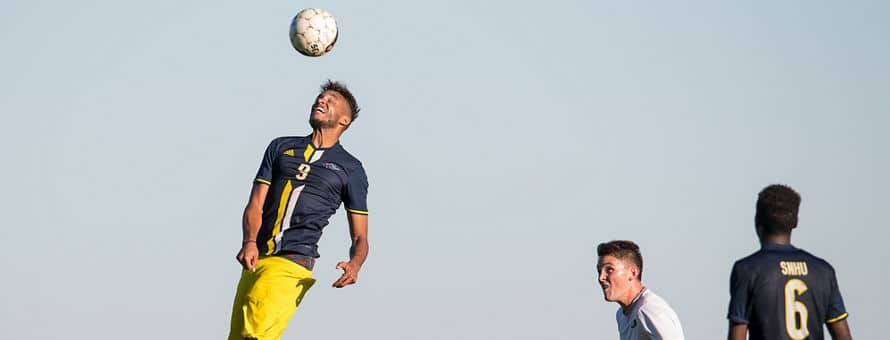What is a Student-Athlete?

The life of a student-athlete blends academics and athletics into unique college experiences. As a student-athlete, you'll likely have all kinds of obligations, such as classes, workouts, practices, games and many other social and community events.
From early morning training sessions to late nights studying, student-athletes use their focus, discipline and time-management skills to stay on top of their often hectic schedules. Dive into the world of student-athletes to see what it's like to be one and some of the benefits and obstacles they face. You'll also learn some tips for balancing the intricacies within this role.
So, What Is the Definition of Student-Athlete – And What's It Like to Be One?

"A student-athlete is someone who is enrolled in school and participates in the institution's athletic offerings," according to Tricia Cote, associate director of athletics at Southern New Hampshire University (SNHU).
Coordinating college schoolwork and sports requires dedication. For instance, at SNHU, Cote said student-athletes are required to maintain a GPA of 2.0 or above, be a full-time student, attend team-related events and adhere to the NCAA legislation.
This means prioritizing your studies and ensuring that grades remain a top priority, said Danielle Sirois '22, a former SNHU women's basketball player who earned her bachelor's in psychology with minors in behavioral neuroscience and special education.
"That includes consistently going to all of your classes, getting homework/projects/papers done, going to office hours/tutoring and meeting with advisors," Sirois said.
![]() Beyond coursework, a student-athlete's life includes a demanding schedule of commitments related to the sport they play. As a women's basketball team member, Sirois described a packed routine: "We had to attend daily practices/skill workouts, lifting/conditioning, film meetings, individual meetings with coaches, treatment appointments with athletic trainers and team volunteering outings," she said.
Beyond coursework, a student-athlete's life includes a demanding schedule of commitments related to the sport they play. As a women's basketball team member, Sirois described a packed routine: "We had to attend daily practices/skill workouts, lifting/conditioning, film meetings, individual meetings with coaches, treatment appointments with athletic trainers and team volunteering outings," she said.
The obligations for student-athletes shift with the ebb and flow of the season, Sirois said. But whether pre/post-season or in-season, she said, "We consistently felt responsible for winning."
As an upperclassman, Sirois also took on a supportive role with her younger teammates. She noted that she ensured her teammates:
- Had a shoulder to lean on
- Knew the weekly schedule
- Understood the plays
- Were involved in team activities
Individual wellness is also a big focus. "This meant eating right, staying in shape, watching film and prioritizing my mental health," Sirois said.
What Are the Benefits of Being a Student-Athlete?
While the benefits of being a student-athlete can vary for each individual, many share a common sense of unity and support. "The camaraderie they build within their teams is a great benefit," said Cote.

For Sirois, the community aspect was the most rewarding. "The teammates I met throughout my time playing basketball at SNHU will be my best friends forever," she said.
She also really enjoyed traveling around the country throughout the season. "Attending games and sharing that bond with other athletes over sports was a really fun way to build relationships," Sirois said. "Nights together in hotel rooms and in new cities were always some awesome experiences."
The benefits of being a student-athlete may even extend beyond graduation. According to Work In Sports, a career resource for the sports industry, the skills developed through their experience can help set them apart when looking for a job. Work In Sports noted that employers value student-athletes for their ability to work as part of a team, lead in high-pressure situations and communicate effectively with diverse groups.
Work In Sports also reported that years of juggling practices, games and academics can build time management and discipline, which may reassure employers that student-athletes can prioritize tasks and meet deadlines. Additionally, the adversity a student-athlete faces fosters perseverance — a quality that drives personal and professional growth, according to BSN Sports, a sports solutions website.
What Are Some Obstacles for a Student-Athlete?
![]() The life of a student-athlete comes with its share of unique challenges, many of which revolve around managing roles both in and out of the classroom. According to Cote, one of the primary hurdles is mastering time-management.
The life of a student-athlete comes with its share of unique challenges, many of which revolve around managing roles both in and out of the classroom. According to Cote, one of the primary hurdles is mastering time-management.
"Time-management is a tough balance for some student-athletes. It's imperative that they do well in the classroom in order to continue in their sport," she said. "However, there are daily practices and games multiple times a week that keep them very busy."
For freshmen, the barriers often involve figuring out where they fit within the team and university environment. Sirois shared some of the challenges that younger student-athletes face:
- Coordinating additional responsibilities with your sport
- How to navigate friendships outside your team
- How you can still be a leader as a freshman
- How you will contribute to the team's success
- Knowing when it's necessary to ask for help
As you mature into an upperclassman, Sirois said, the demands can shift.
"The biggest obstacles are taking care of yourself while also taking care of your teammates and remaining positive about your future as your athletic career comes to an end," she said. "There's no rule book for figuring these things out — it's a lot of trial and error until you determine what works best for you."
Find Your Program
4 Tips for Balancing Academics and Athletics
Being a student-athlete can be challenging. But, with the right game-plan in place, you can succeed in and out of the classroom. Here are four tips to help you balance your studies and athletics.
 Stay Organized
Stay Organized
Being organized can actually help you manage your time. For Sirois, it was a fundamental part of her routine. "My first tip is to get a planner," she said. "I started writing everything down when I got to college, and this helped me visually see all the places I had to be in a given week (practice, workouts, lifts, conditioning, class, study hall, meetings)."
 Be Creative About When You Do Homework
Be Creative About When You Do Homework
Finding the right time to focus on homework can make a difference in managing your schedule. Travel times, like bus rides to away games, may offer a chance to catch up on assignments or review class materials, Cote said. Sirois noted that she often used these moments to stay on top of her coursework, too.
 Build a Support Network
Build a Support Network
A strong support network can help student-athletes manage the demands of their dual roles. Sirois said this network might include teammates, coaches, professors and other campus resources, providing different kinds of guidance depending on the situation. Support networks may offer opportunities for collaboration, advice or simply a listening ear when needed.
Whether seeking academic help or navigating a personal dilemma, leaning on others could help ease the pressures of being a student-athlete.
 Self-Care
Self-Care
Self-care can play a role in helping you manage your responsibilities effectively, according to Sirois. Pay attention to your physical health, mental well-being or find ways to recharge amidst a busy schedule. Prioritizing wellness can also be beneficial to maintaining energy and motivation throughout the season.
"A balanced schedule, good grades and a starting spot don't mean much if you aren't enjoying the process and staying healthy," she said.
Growing Through the Game

For SNHU men's basketball teammates Noah Kamba '24 and Derrick Grant Jr. '24, their time in college was more than just academics and athletics — it was a testament to the bond they forged.
They met while pursuing their bachelor's degrees in business administration, and from playing basketball together to earning their diplomas, they shared a path filled with adversities and accomplishments. Standing side-by-side at SNHU's spring 2024 Commencement, they reflected on the road they had traveled together. "Now, this is my brother," Grant said.
For Kamba, the moment was deeply meaningful. "Coming from the obstacles we had to face to be here right now, the things we had to go through and for our families, this means a lot," he said. "This a big accomplishment ... we're really grateful for this opportunity and it means the world."
![]() The life of a student-athlete, as Kamba and Grant know well, comes with a distinctive set of obligations. "At the end of the day, it helps you prepare for things later on in life," said Kamba. "It builds you ... being a student-athlete helps you balance all of the things that you're going to have to face."
The life of a student-athlete, as Kamba and Grant know well, comes with a distinctive set of obligations. "At the end of the day, it helps you prepare for things later on in life," said Kamba. "It builds you ... being a student-athlete helps you balance all of the things that you're going to have to face."
Grant echoed this sentiment. "(Being a student-athlete) helps you grow," he said. "You could end up coming in with no responsibilities and end up having a lot on your plate, where you have to take care of those."
Their experiences taught them that being a student-athlete extends beyond the court. "You have to keep your grades up ... you have to hold a certain image for yourself," said Grant. "It's a journey, but it helps you grow over the years."
As a first-generation college student, Grant acknowledged that he didn't have a roadmap to guide him. However, his experience as a student-athlete taught him how to fight through adversity and "be a better me."
For many student-athletes, setbacks and struggles are just stepping stones towards growth. "Being resilient, knowing that everything might not go your way, but that it's just preparing you for something better," Kamba said. "That's what SNHU taught me the most."
The path, Kamba said, was anything but straightforward. "It was crooked and had turns and hurdles, but at the end of the day, if you're willing to work hard, you can accomplish anything," he said.
A degree can change your life. Choose your program from 200+ SNHU degrees that can take you where you want to go.
Nicholas Patterson ’22 ’25MFA is a writer based in West Michigan with several years of experience as a content creator in higher education. He’s an alumnus of Southern New Hampshire University (SNHU), where he earned both his bachelor’s in English and creative writing and his Master of Fine Arts in Creative Writing. When his head’s not in novels, you can find him outside dreaming up his own stories. Connect with him on LinkedIn.
Explore more content like this article

Heart, Hope and Some Help Along the Way: SNHU’s Fall Class of 2025

Old Time Charm, Big Time Fun at SNHU’s Homecoming

‘What if We Go Back to School... Together?’
About Southern New Hampshire University

SNHU is a nonprofit, accredited university with a mission to make high-quality education more accessible and affordable for everyone.
Founded in 1932, and online since 1995, we’ve helped countless students reach their goals with flexible, career-focused programs. Our 300-acre campus in Manchester, NH is home to over 3,000 students, and we serve over 135,000 students online. Visit our about SNHU page to learn more about our mission, accreditations, leadership team, national recognitions and awards.


